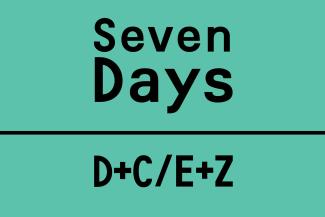In brief
News of the week

EU triples funding for Mediterranean mission
After the death of more that 800 refugees in the Mediterranean Sea last weekend, the European Union has decided to triple the funding of Triton, its border-protection mission. Several countries have offered to provide more boats and aircrafts for rescue operations. At an extraordinary summit in Brussels on Thursday, the European leaders also decided to destroy smuggler boats, to step up cooperation with the refugees’ countries of origin and to deploy immigration officers to non-EU countries.
With the newly pledged funding of about € 9 million per month, the EU wants to raise its commitment to the level of Mare Nostrum, the Italian search-and-rescue mission that was replaced last year with Triton. Triton is run by Frontex, the EU agency for external border security. Within Trition, the European leaders have now decided to prioritise sea rescue instead of border protection as previously.
Critics bemoan that Triton’s operation area remains the same. It covers only European waters while Mare Nostrum reached out to the coasts of Africa. Human-rights activists consider the measures agreed in Brussels inadequate.
Sources: BBC, Spiegel.de
Morsi sentenced to 20 years
A court in Cairo has sentenced former president Mohamed Morsi to 20 years in jail. The leader of the Muslim Brotherhood and 12 other members were convicted on charges of violence, kidnapping and torture in the context of the killing of protesters during demonstrations in 2012. They were acquitted of murder charges, which carry the death sentence.
Human-rights activists condemned the judgment as politically motivated. Morsi himself said the court had no authority, according to the BBC. He faces charges in four more cases. Amongst others, he is accused of leaking secret information to Qatar and plotting with the Palestinian militant group Hamas against Egypt.
Morsi was the first democratically elected president of Egypt. His predecessor Hosni Mubarak was forced to resign by protests against his authoritarian regime in the Arab spring in 2011. Morsi was deposed in 2013 by Abdel Fattah al-Sisi, who was his defense minister and is now the president. The new regime has prosecuted many of Morsi’s supporters.
Sources: BBC, Al Jazeera, Reuters
WHO admits failings in Ebola response
The WHO has admitted serious failings in its response to the Ebola epidemic in west Africa. In a recently published statement, the UN’s public health agency acknowledges that there “must be an ability to respond quickly” to diseases like Ebola, which was not possible with its current capacities. The WHO writes that “a disease threat is a threat to us all” and “therefore requires sharing of resources”. Another lesson learnt is the importance of communicating risks early.
Doctors Without Borders had warned the WHO shortly after the outbreak in March 2014, that the epidemic had an unprecedented scale. The WHO responded at that time that everything was under control. Critics argue that the UN agency’s reluctance to define the outbreak as an emergency was a major factor in failing to stop the disease immediately. An estimated 25,000 people got infected with Ebola, and about 10,000 died.
WHO Director-General Margaret Chan has pledged major reforms to prepare for the next emergency. For example, emergency reserve forces shall be established and stronger international health rules introduced. According to an internal WHO document obtained by AP, the WHO bureaucracy was a problem in the Ebola crisis. For instance, in Guinea $ 500,000 in aid were blocked by administrative hurdles.
Sources: BBC, WHO, Al Jazeera, AP
China promises to make huge investments in Pakistan
China wants to invest $ 46 billion in Pakistan’s infrastructure and build a transport corridor to link China to the Arabian Sea. China’s President Xi Jinping made the plans public during a visit to Pakistan this week. They centre on a network of rails, roads and pipelines that will link Xinjiang province in western China with the Pakistani port of Gwadar. The projects would give China direct access to the Indian Ocean.
According to the BBC, the new investment will be almost three times the amount of the entire foreign direct investment Pakistan has received since 2008. The government in Islamabad hopes the investment will strengthen its struggling economy and help end chronic power shortages.
Sources: The New York Times, BBC
Famine looming in Niger
A famine is looming in the west African country of Niger. Two and a half million people are threatened by hunger, according to the government. The rainy season last year was poor and lead to bad harvests and drought. The situation is aggravated by 200,000 refugees from Nigeria and Mali who fled the Islamist terror militia Boko Haram.
Aid organisations are trying to deliver grains and nutrient-rich food to little children and pregnant women. Help is difficult because the refugees are scattered along the border, and the capital city of Diffa is in a state of emergency because of violent attacks.
According to the World Food Programme, Niger struggles with poor harvests every year and is still in the process of recovery from previous crises. The Nigerien government launched a project to irrigate 130,000 hectares and hopes for 500,000 tonnes food. The other hope is a strong coming rainy season.
Sources: Le Monde, ORF
These items were compiled by Rebecca Renz and Katja Dombrowski on the basis of international media coverage.











